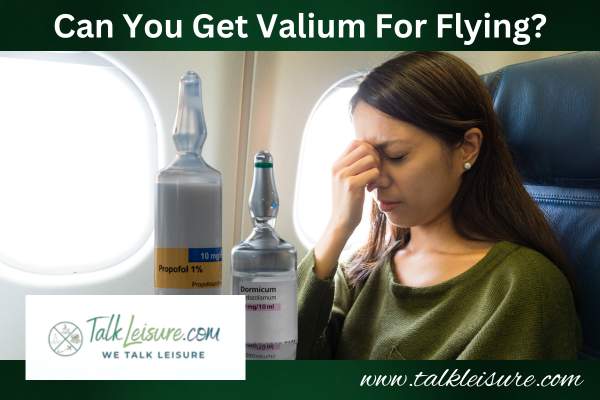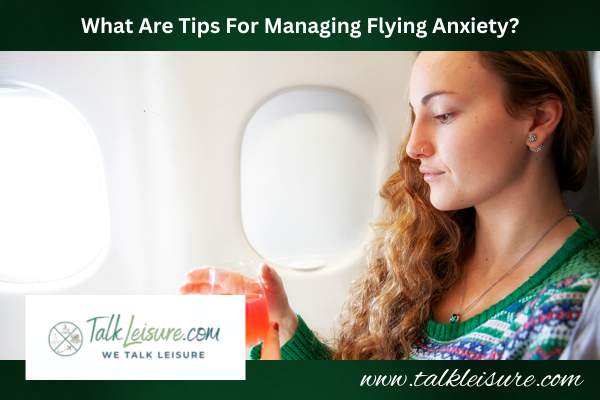Are you one of those people who can’t bear the thought of flying?
The anxiety and panic attacks that come with boarding a plane can be extremely debilitating, making the whole experience miserable for you and those around you.
Medications can help ease the symptoms and make the experience much more manageable.
One such medication is Valium.
But the question on many people’s minds is, “Can I Get Valium For flying?”
This post explores the answer to that question and provides helpful tips for managing your anxiety while flying.
Flying can be an unpleasant experience, especially for those with fear and anxiety.
There are different methods of coping with this fear, including medication.
One such medication is Valium, a benzodiazepine commonly prescribed to treat anxiety disorders.
Many people wonder if they can get Valium for flying, and the answer is yes, with a prescription from a doctor.
Obtaining a prescription for Valium for flying can be as simple as scheduling an appointment with a GP and explaining the situation.
It is important to be honest about the severity of the fear and anxiety to ensure the appropriate dosage is prescribed.
Disclosing any current or past medical conditions and medications is essential to avoiding interactions.
What Is Valium?

Valium is a medication commonly used to treat conditions such as anxiety, muscle spasms, and alcohol withdrawal symptoms.
Its active ingredient is diazepam, and it works by enhancing the effects of a neurotransmitter in the brain called GABA, which helps to calm the nervous system.
The drug is usually taken orally in tablet form, and its effects can last several hours.
Valium is a controlled substance in many countries, meaning it can only be obtained with a prescription from a licensed healthcare provider.
While it is useful in treating certain conditions, it can also be addictive and should be used only as directed by a healthcare professional.
Can You Get Valium For Flying?

Many people suffer from the fear of flying, which can ruin what should be an exciting experience of traveling to new destinations.
One solution that some turn to is Valium, a medication that can help ease anxiety and calm nerves.
It is a medication in the benzodiazepine family that works by reducing the activity of the brain nerves, helping to produce a calming and relaxing effect.
Many have claimed that taking Diazepam before a flight has helped them manage their fear of flying, leading some to ask if it is possible to obtain Valium for flying and the risks of taking this medication.
It is important to consult with a medical professional before taking any medication and fully understand its risks and benefits.
GP’s Prescription And Dosage For Diazepam
Diazepam, commonly known as Valium, is one medication that has been prescribed by General Practitioners (GPs) for flight anxiety.
Patients may ask their GP for a prescription for Diazepam for fear of flying, and some have reported success in using the drug to alleviate their anxiety.
However, GPs are increasingly reluctant to prescribe Diazepam due to concerns about its addictive qualities and long-term effects on cognition and balance.
Diazepam is also contraindicated for treating phobic states according to the British National Formulary, and doctors who prescribe it for fear of flying risk legal consequences.
If a GP prescribes Diazepam for flying, they usually advise taking a low dosage, such as 2mg tablets, about an hour before the flight and possibly another dose while on the plane.
Personal Experience Of Using Diazepam For Fear Of Flying
Many people who fear flying turn to medication to help them cope with the anxiety of air travel. Diazepam, commonly known as Valium, is a medication often prescribed for this purpose.
One individual recently shared their personal experience of using Diazepam for fear of flying on a trip to Greece with their girlfriend.
Before the trip, they sought advice from their GP, who wrote them a prescription for 2mg tablets of Diazepam.
The individual found that taking the medication helped ease their anxiety before and during the flight.
Although they were not completely comfortable, they felt more accepting of the situation and could cope better with their fear.
Why Doctors Do Not Prescribe Valium For Fear Of Flying

Doctors no longer prescribe diazepam or drugs like lorazepam, temazepam, or clonazepam for fear of flying.
This is because taking these drugs reduces patient awareness and reaction times, increasing the risk of being unable to react to save one’s life during emergencies.
Moreover, these drugs can cause an unnaturally deep sleep, increasing the risk of developing blood clots, especially on long flights.
These drugs also have short-term bad effects on memory, coordination, concentration, and reaction times, and long-term use may lead to addiction, with withdrawal symptoms that include hallucinations, agitation, and confusion.
Using these drugs may also cause paradoxical agitation and aggression, and the person may behave in a way that they would not normally, which could pose a risk to safety on the plane and even get the person into trouble with the law.
Diazepam is a controlled drug in the UK, and the prescribing guidelines recommend that it be used only for managing a “crisis in generalized anxiety” and not for treating a fear of flying, which is not a generalized anxiety disorder.
Consequently, doctors do not prescribe Valium for fear of flying anymore. Instead, they recommend aviation industry-recommended flight anxiety courses.
What Are The Alternatives For Valium
People who fear flying may often turn to prescription medications such as Valium to manage their anxiety.
However, due to these medications’ potential risks and negative side effects, doctors and healthcare professionals no longer recommend them as a treatment option.
Therefore, individuals can try over-the-counter options or natural remedies instead of seeking a prescription for these medications.
Natural remedies And Supplements
Many people experience anxiety when it comes to flying and may turn to prescription medications such as Valium to ease their nerves.
However, several natural remedies and supplements can also be utilized as alternatives to Valium.
These options provide a non-addictive approach to managing anxiety without the risk of dependency or adverse side effects.
Consuming a healthy, balanced diet low in sugar and caffeine and high in nutrients such as B vitamins, magnesium, and omega-3 fatty acids can also alleviate anxiety symptoms.
In addition, supplements such as melatonin, L-theanine, and passionflower may provide a calming effect to promote relaxation during stressful situations.
It is important to consult with a healthcare provider before starting any new supplement or natural remedy.
Especially if you are taking supplements like creatine while flying with flight anxiety.
Some supplements like kratom capsules provide excellent pain relief and good for treating anxiety and depression but they are banned in some countries. Therefore, if you are taking kratom check on the legal status for it at your destination.
Relaxation techniques
Many individuals who suffer from flight anxiety may turn to Valium or other benzodiazepines for relief.
However, these medications can be addictive and come with potential side effects.
Fortunately, there are non-addictive alternatives that can help individuals relax while flying.
Relaxation techniques such as deep breathing, progressive muscle relaxation, visualization, and meditation can greatly reduce anxiety.
Practicing these techniques regularly before the flight is important to ensure they are effective.
Cognitive-Behavioral Therapy (CBT)
Cognitive-Behavioral Therapy (CBT) offers a proven and effective treatment option for those who fear flying.
This type of therapy focuses on the connection between thoughts, emotions, and behavior.
CBT aims to identify the root cause of the phobia and replace negative thought patterns with more positive and constructive ones.
By breaking the cycle of negative thoughts and behaviors, the patient can gain more control over their fear and gradually learn to overcome it.
During CBT sessions, the patient will work with a therapist to learn relaxation techniques, address underlying anxiety, and challenge irrational beliefs about flying.
With the help of CBT, individuals can take the first step in confronting their fear of flying and eventually go on to enjoy the benefits of safe, comfortable air travel.
Virtual Reality Exposure Therapy
Virtual reality exposure therapy is a newer treatment method for individuals who suffer from a fear of flying.
It uses virtual reality technology to simulate airplane experiences in a safe and controlled environment.
This allows the individual to gradually become more comfortable with the thought of flying.
The therapist may start with simple exercises, such as sitting in a virtual airplane or watching one take off, and gradually progress to more challenging scenarios, such as experiencing turbulence.
This type of therapy effectively treats aerophobia and has the added benefit of being flexible and customizable to each individual’s needs.
Virtual reality exposure therapy may be a good alternative for those who are uncomfortable with traditional exposure therapy or do not wish to use medication.
It is important to discuss treatment options with a qualified healthcare provider to determine the best course of action.
What Are Tips For Managing Flying Anxiety?

For those who suffer from flying anxiety, many tips can help manage the fear.
One of the most important is to speak to a doctor about the issue.
They can advise on coping and may even prescribe medication to help ease anxiety.
Some people find that caffeinated or alcoholic drinks can make anxiety worse, so it’s best to avoid them.
Instead, opt for a warm drink like hot chocolate or cold juice.
Planning can also help, such as pre-booking seats to avoid height triggers or choosing a non-window seat.
It’s important to remember that flying is the safest mode of transport, and airlines have trained pilots and cabin crew dedicated to ensuring safety.
Those with flying anxiety should know that they are not alone.
Many people suffer from the fear of flying, and it’s completely normal.
It’s important to communicate the fear with others, whether a doctor, a trusted friend, or a family member.
For some people, flying anxiety may worsen, making air travel difficult. In these cases, it’s important to prioritize one’s mental health and make alternative travel arrangements.
People with flight anxiety are recommended to avoid packing suspicious things while flying.
For example, although it is allowed to carry a grinder when flying, avoiding it will be helpful for stress-free travel.
This is because even a trace of herbs in a used grinder may lead to suspicions, and such incidents trigger anxiety.
Conclusion
Valium is a prescription drug that belongs to the class of benzodiazepines. It is commonly prescribed for anxiety disorders, muscle spasms, and seizures.
Due to its sedating properties, many people wonder if it is possible to get Valium for flying.
While Valium can help reduce anxiety and promote relaxation, it is not recommended for use while flying.
The use of Valium or any other benzodiazepine can cause drowsiness and impair cognitive function, which can lead to accidents or errors in judgment.
In addition, Valium has a high potential for abuse, dependence, and addiction.
If you are experiencing anxiety or fear when flying, it is important to talk to your doctor or a mental health professional.
There are other treatments available that can help you manage your symptoms without the risks associated with Valium.
For example, cognitive-behavioral therapy (CBT), relaxation techniques, and exposure therapy effectively treat anxiety disorders.
In summary, while Valium may seem like a quick fix to alleviate flight anxiety, it is not a safe or appropriate solution.
If you are struggling with anxiety when flying, speak to a professional about alternative treatments to help you manage your symptoms without the risk of dependence, addiction, or cognitive impairment.
FAQS
What Is The Best Medication For Flight Anxiety?
While Diazepam, commonly known as Valium, was previously prescribed for flight anxiety, it is no longer recommended.
Airline anxiety courses are an option recommended by the aviation industry. These courses offer tools and techniques to help manage and reduce flight anxiety.
One popular option is the Takeoff Today Program, which offers instant downloads with a money-back guarantee.
Another option is the SOAR app, which incorporates relaxation techniques and encourages positive thinking.
How Much Valium Should I Take For Flight Anxiety?
Valium might be a solution for you. It is a prescription medication for anxiety disorders, including flight anxiety.
However, it is essential to know the appropriate dosage of Valium before taking it for flight anxiety.
Valium should only be taken as prescribed by a doctor.
The dosage for flight anxiety varies from person to person. The ideal dosage will depend on the severity of anxiety and body weight.
It is also essential to consider the duration of the flight. Taking too much Valium can cause drowsiness, coordination problems, and fainting.
Taking 2–5 mg of Valium around 45–60 minutes before a flight is a standard dosage for those with mild anxiety.
Is Valium Bad For The Brain?
Valium is a medication doctors prescribe to treat anxiety, muscle spasms, and seizures.
It works by enhancing the effects of a natural chemical in the body, which helps to calm the mind and body.
However, people often wonder if it is bad for the brain. Here are some frequently asked questions:
Using Valium for a prolonged period or in high doses can cause various negative impacts on the brain, including memory impairment and cognitive decline.
Moreover, it can lead to dependency, which can cause intense cravings, withdrawal, and rebound anxiety, making quitting difficult.






